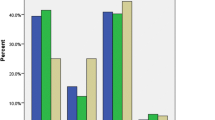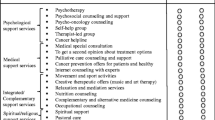Abstract
Purpose
Diagnosis of breast cancer and its treatment dramatically affects women’s psychological health. This study investigated the prevalence of depression and anxiety and their related factor in breast cancer women.
Methods
We conducted a cross-sectional study with a sample of 120 women with breast cancer in Zahedan, Iran, 2020. Data were collected using instruments included: Hospital Anxiety and Depression Scale (HADS), Supportive Care Needs Survey (SCNS-SF34), Multidimensional Scale of Perceived Social Support (MSPSS), The adjustment to illness measurement inventory for Iranian women with breast cancer (AIMI-IBC). We analyzed the data using the ANOVA, independent sample t-test, Kruskal Wallis, Mann‐Whitney U test, Pearson’s and Spearman’s correlation coefficients.
Results
The prevalence of depression and anxiety in women with breast cancer was 66.6% and 60%, respectively. A significant positive correlation was found between anxiety and depression and unmet psychological needs, care/support needs, and emotional turmoil coping strategy, while reasonable efforts and avoidance coping strategies and adjusting to disease were negatively correlated with anxiety and depression. Also, linear regression results indicated unmet psychological needs, emotional turmoil coping strategy, and a high level of depression predicted a high anxiety level. A lower level of depression was indicated by reasonable efforts strategy and less level of anxiety.
Conclusions
Women with breast cancer reported a high level of depression and anxiety in Zahedan, and clinicians should pay more attention to these patients’ psychological distress. Resolving the unmet need of patients, increasing social support, and using the right coping strategy have an essential role in breast cancer women’s psychological distress control.
Similar content being viewed by others
Data availability
The datasets used and analyzed during this study are available from the corresponding author on reasonable request.
Code availability
Not applicable.
References
Shin HR, Boniol M, Joubert C, Hery C, Haukka J, Autier P et al (2010) Secular trends in breast cancer mortality in five East Asian populations: Hong Kong, Japan, Korea. Singapore and Taiwan Cancer science 101(5):1241–1246. https://doi.org/10.1111/j.1349-7006.2010.01519.x
Wondimagegnehu A, Abebe W, Abraha A, Teferra S (2019) Depression and social support among breast cancer patients in Addis Ababa, Ethiopia. BMC Cancer 19(1):836. https://doi.org/10.1186/s12885-019-6007-4
Suwankhong D, Liamputtong P (2016) Social support and women living with breast cancer in the south of Thailand. J Nurs Scholarsh 48(1):39–47. https://doi.org/10.1111/jnu.12179
Dukes Holland K, Holahan CK (2003) The relation of social support and coping to positive adaptation to breast cancer. Psychol Health 18(1):15–29. https://doi.org/10.1080/0887044031000080656
Li J, Lambert VA (2007) Coping strategies and predictors of general well-being in women with breast cancer in the People’s Republic of China. Nurs Health Sci 9(3):199–204. https://doi.org/10.1111/j.1442-2018.2007.00325.x
Wang F, Liu J, Liu L, Wang F, Ma Z, Gao D et al (2014) The status and correlates of depression and anxiety among breast-cancer survivors in Eastern China: a population-based, cross-sectional case–control study. BMC Public Health 14(1):326. https://doi.org/10.1186/1471-2458-14-326
Karakoyun-Celik O, Gorken I, Sahin S, Orcin E, Alanyali H, Kinay M (2010) Depression and anxiety levels in woman under follow-up for breast cancer: relationship to coping with cancer and quality of life. Med Oncol 27(1):108–113. https://doi.org/10.1007/s12032-009-9181-4
Shun S-C, Yeh K-H, Liang J-T, Huang J, Chen S-C, Lin B-R et al (2014) Unmet supportive care needs of patients with colorectal cancer: significant differences by type D personality. Oncol Nurs Forum. https://doi.org/10.5353/th_b5662750
Uchida M, Akechi T, Okuyama T, Sagawa R, Nakaguchi T, Endo C et al (2011) Patients’ supportive care needs and psychological distress in advanced breast cancer patients in Japan. Jpn J Clin Oncol 41(4):530–536. https://doi.org/10.1093/jjco/hyq230
Liao Y-C, Liao W-Y, Shun S-C, Yu C-J, Yang P-C, Lai Y-H (2011) Symptoms, psychological distress, and supportive care needs in lung cancer patients. Support Care Cancer 19(11):1743–1751. https://doi.org/10.1007/s00520-010-1014-7
Pérez-Fortis A, Fleer J, Sánchez-Sosa JJ, Veloz-Martínez MG, Alanís-López P, Schroevers MJ et al (2017) Prevalence and factors associated with supportive care needs among newly diagnosed Mexican breast cancer patients. Support Care Cancer 25(10):3273–3280. https://doi.org/10.1007/s00520-017-3741-5
Livneh H. Psychosocial adaptation to cancer: the role of coping strategies. Journal of rehabilitation. 2000;66(2).
Hajian S, Mehrabi E, Simbar M, Houshyari M (2017) Coping strategies and experiences in women with a primary breast cancer diagnosis. Asian Pac J Cancer Prev: APJCP 18(1):215. https://doi.org/10.22034/APJCP.2017.18.1.215
Saniah A, Zainal N. Anxiety, depression and coping strategies in breast cancer patients on chemotherapy. Malays J Psychiatry. 2010;19(2).
Kavitha R, Jayan C (2014) Role of social support on cancer distress among breast cancer patients. Guru J Behav Soc Scie 2(1):247–251
Hughes S, Jaremka LM, Alfano CM, Glaser R, Povoski SP, Lipari AM et al (2014) Social support predicts inflammation, pain, and depressive symptoms: longitudinal relationships among breast cancer survivors. Psychoneuroendocrinology 42:38–44. https://doi.org/10.1016/j.psyneuen.2013.12.016
Liu B, Wu X, Shi L, Li H, Wu D, Lai X et al (2021) Correlations of social isolation and anxiety and depression symptoms among patients with breast cancer of Heilongjiang province in China: the mediating role of social support. Nurs Open 8(4):1981–1989. https://doi.org/10.1002/nop2.876
Zamanian H, Amini-Tehrani M, Jalali Z, Daryaafzoon M, Ala S, Tabrizian S et al (2021) Perceived social support, coping strategies, anxiety and depression among women with breast cancer: evaluation of a mediation model. Eur J Oncol Nurs 50:101892. https://doi.org/10.1016/j.ejon.2020.101892
Zigmond AS, Snaith RP (1983) The hospital anxiety and depression scale. Acta Psychiatr Scand 67(6):361–370. https://doi.org/10.1111/j.1600-0447.1983.tb09716.x
Montazeri A, Vahdaninia M, Ebrahimi M, Jarvandi S (2003) The Hospital Anxiety and Depression Scale (HADS): translation and validation study of the Iranian version. Health Qual Life Outcomes 1(1):14. https://doi.org/10.1186/1477-7525-1-14
Zimet GD, Dahlem NW, Zimet SG, Farley GK (1988) The multidimensional scale of perceived social support. J Pers Assess 52(1):30–41. https://doi.org/10.1207/s15327752jpa5201_2
Salimi A, Joukar B, Nikpour R. Internet and communication: perceived social support and loneliness as antecedent variables. 2009.
McElduff P, Boyes A, Zucca A, Girgis A. Supportive Care Needs Survey: a guide to administration, scoring and analysis. Newcastle: Centre for Health Research & Psycho-oncology. 2004.
Abdollahzadeh F, Moradi N, Pakpour V, Rahmani A, Zamanzadeh V, Mohammadpoorasl A et al (2014) Un-met supportive care needs of Iranian breast cancer patients. Asian Pac J Cancer Prev 15(9):3933–3938. https://doi.org/10.7314/apjcp.2014.15.9.3933
Hajian S, Mehrabi E, Simbar M, Houshyari M, Zayeri F, Hajian P. Designing and psychometric evaluation of adjustment to illness measurement inventory for Iranian women with breast cancer. Iranian journal of cancer prevention. 2016;9(4). https://doi.org/10.17795/ijcp-5461
Bjelland I, Dahl AA, Haug TT, Neckelmann D (2002) The validity of the Hospital Anxiety and Depression Scale: an updated literature review. J Psychosom Res 52(2):69–77. https://doi.org/10.1016/S0022-3999(01)00296-3
Vickberg S (2001) Fears about breast cancer recurrence: interviews with a diverse sample. Cancer Pract 9(5):237–243. https://doi.org/10.1046/j.1523-5394.2001.009005237.x
Schmid-Büchi S, Halfens RJ, Dassen T, Van Den Borne B (2008) A review of psychosocial needs of breast-cancer patients and their relatives. J Clin Nurs 17(21):2895–2909. https://doi.org/10.1111/j.1365-2702.2008.02490.x
Hashemi S-M, Rafiemanesh H, Aghamohammadi T, Badakhsh M, Amirshahi M, Sari M, et al. Prevalence of anxiety among breast cancer patients: a systematic review and meta-analysis. Breast Cancer. 2020:1–13. https://doi.org/10.1007/s12282-019-01031-9
Dianatinasab SMKM, Fararouei M, Moameri H, Pakzad R, Gharaei HA, Ghaiasvand R. Meta-analysis of high prevalence of depression among breast cancer survivors in Iran: calling community supportive care programs. https://doi.org/10.4178/epih.e2019030
Mehnert A, Koch U (2008) Psychological comorbidity and health-related quality of life and its association with awareness, utilization, and need for psychosocial support in a cancer register-based sample of long-term breast cancer survivors. J Psychosom Res 64(4):383–391. https://doi.org/10.1016/j.jpsychores.2007.12.005
Mosleh SM, Alja’afreh M, Alnajar MK, Subih M (2018) The prevalence and predictors of emotional distress and social difficulties among surviving cancer patients in Jordan. Eur J Oncol Nurs 33(35):40. https://doi.org/10.1016/j.ejon.2018.01.006
Yang Y-L, Liu L, Wang Y, Wu H, Yang X-S, Wang J-N et al (2013) The prevalence of depression and anxiety among Chinese adults with cancer: a systematic review and meta-analysis. BMC Cancer 13(1):393. https://doi.org/10.1186/1471-2407-13-393
Mirzaei M, Ardekani SMY, Mirzaei M, Dehghani A (2019) Prevalence of depression, anxiety and stress among adult population: results of yazd health study. Iran J Psychiatry 14(2):137. https://doi.org/10.18502/ijps.v14i2.993
Montazeri A, Harirchi I, Vahdani M, Khaleghi F, Jarvandi S, Ebrahimi M et al (2000) Anxiety and depression in Iranian breast cancer patients before and after diagnosis. Eur J Cancer Care 9(3):151–157. https://doi.org/10.1046/j.1365-2354.2000.00219.x
Komachi MH, Kamibeppu K, Nishi D, Matsuoka Y (2012) Secondary traumatic stress and associated factors among Japanese nurses working in hospitals. Int J Nurs Pract 18(2):155–163. https://doi.org/10.1111/j.1440-172x.2012.02014.x
Vodermaier A, Linden W, MacKenzie R, Greig D, Marshall C (2011) Disease stage predicts post-diagnosis anxiety and depression only in some types of cancer. Br J Cancer 105(12):1814–1817. https://doi.org/10.1038/bjc.2011.503
Tel H, Tel H, Doğan S (2011) Fatigue, anxiety and depression in cancer patients. Neurol Psychiatry Brain Res 17(2):42–45. https://doi.org/10.1016/j.npbr.2011.02.006
Reich M, Lesur A, Perdrizet-Chevallier C (2008) Depression, quality of life and breast cancer: a review of the literature. Breast Cancer Res Treat 110(1):9–17. https://doi.org/10.1007/s10549-007-9706-5
Groenvold M, Petersen MA, Idler E, Bjorner JB, Fayers PM, Mouridsen HT (2007) Psychological distress and fatigue predicted recurrence and survival in primary breast cancer patients. Breast Cancer Res Treat 105(2):209–219. https://doi.org/10.1007/s10549-006-9447-x
Ng CG, Mohamed S, See MH, Harun F, Dahlui M, Sulaiman AH et al (2015) Anxiety, depression, perceived social support and quality of life in Malaysian breast cancer patients: a 1-year prospective study. Health Qual Life Outcomes 13(1):205. https://doi.org/10.1186/s12955-015-0401-7
Benson RB, Cobbold B, Boamah EO, Akuoko CP, Boateng D. Challenges, coping strategies, and social support among breast cancer patients in Ghana. Advances in Public Health. 2020:NA-NA. https://doi.org/10.1155/2020/4817932
Kim J, Han JY, Shaw B, McTavish F, Gustafson D (2010) The roles of social support and coping strategies in predicting breast cancer patients’ emotional well-being: testing mediation and moderation models. J Health Psychol 15(4):543–552. https://doi.org/10.1177/1359105309355338
Wang X, Wang S-S, Peng R-J, Qin T, Shi Y-X, Teng X-Y et al (2012) Interaction of coping styles and psychological stress on anxious and depressive symptoms in Chinese breast cancer patients. Asian Pac J Cancer Prev 13(4):1645–1649. https://doi.org/10.7314/apjcp.2012.13.4.1645
Akechi T, Okuyama T, Endo C, Sagawa R, Uchida M, Nakaguchi T et al (2011) Patient’s perceived need and psychological distress and/or quality of life in ambulatory breast cancer patients in Japan. Psychooncology 20(5):497–505. https://doi.org/10.1002/pon.1757
Lisy K, Langdon L, Piper A, Jefford M (2019) Identifying the most prevalent unmet needs of cancer survivors in Australia: a systematic review. Asia Pac J Clin Oncol 15(5):e68–e78. https://doi.org/10.1111/ajco.13176
Wang F, Liu J, Liu L, Wang F, Ma Z, Gao D et al (2014) The status and correlates of depression and anxiety among breast-cancer survivors in Eastern China: a population-based, cross-sectional case–control study. BMC Public Health 14(1):1–6. https://doi.org/10.1186/1471-2458-14-326
Reddick BK, Nanda JP, Campbell L, Ryman DG, Gaston-Johansson F (2006) Examining the influence of coping with pain on depression, anxiety, and fatigue among women with breast cancer. J Psychosoc Oncol 23(2–3):137–157. https://doi.org/10.1300/j077v23n02_09
Acknowledgements
The authors would like to thank all patients that participated in this study. We also appreciated all the health care workers in the clinical oncology department of Khatam-Al-Anbia hospital and the Radiotherapy Department of Ali-Ebne-Abitaleb hospital.
Funding
This work is part of the corresponding author master’s thesis and was supported by the Zahedan University of Medical Sciences.
Author information
Authors and Affiliations
Contributions
HOA, SK, and AAM were involved in the study design.
SK and FSS were involved in the data collection.
MM and SK were involved in the data analysis.
HOA and Sk were involved in the manuscript preparation.
All authors have read and verified the final manuscript.
Corresponding author
Ethics declarations
Ethical considerations and consent to participate.
The ethics committee of Zahedan University of Medical Sciences approved this study (IR.ZAUMS.REC.1399.010). We explained the purpose of the study to all patients and obtained written informed consent.
Consent for publication
Not applicable.
Conflict of interest
The authors declare no competing interests.
Additional information
Publisher's note
Springer Nature remains neutral with regard to jurisdictional claims in published maps and institutional affiliations.
Rights and permissions
About this article
Cite this article
Okati-Aliabad, H., Ansari-Moghadam, A., Mohammadi, M. et al. The prevalence of anxiety and depression and its association with coping strategies, supportive care needs, and social support among women with breast cancer. Support Care Cancer 30, 703–710 (2022). https://doi.org/10.1007/s00520-021-06477-2
Received:
Accepted:
Published:
Issue Date:
DOI: https://doi.org/10.1007/s00520-021-06477-2




